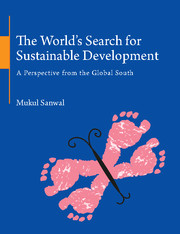Book contents
- Frontmatter
- Dedication
- Contents
- Preface
- Acknowledgments
- Abbreviations
- INTRODUCTION
- 1 Social Dimension of Sustainability
- CONSUMPTION IN AN UNEQUAL WORLD: FRAMING INTERNATIONAL COOPERATION
- CLIMATE POLICY: GLOBAL TO NATIONAL
- SUSTAINABLE DEVELOPMENT: NATIONAL TO GLOBAL
- CONSUMPTION IN A MORE EQUAL WORLD: SHAPING SOCIETAL FUNCTIONS
- GEOPOLITICS TO GEOECONOMICS: RURAL–URBAN DIVIDE, RATHER THAN BETWEEN COUNTRIES
- THE ASIAN CENTURY
- Index
CONSUMPTION IN AN UNEQUAL WORLD: FRAMING INTERNATIONAL COOPERATION
Published online by Cambridge University Press: 18 December 2015
- Frontmatter
- Dedication
- Contents
- Preface
- Acknowledgments
- Abbreviations
- INTRODUCTION
- 1 Social Dimension of Sustainability
- CONSUMPTION IN AN UNEQUAL WORLD: FRAMING INTERNATIONAL COOPERATION
- CLIMATE POLICY: GLOBAL TO NATIONAL
- SUSTAINABLE DEVELOPMENT: NATIONAL TO GLOBAL
- CONSUMPTION IN A MORE EQUAL WORLD: SHAPING SOCIETAL FUNCTIONS
- GEOPOLITICS TO GEOECONOMICS: RURAL–URBAN DIVIDE, RATHER THAN BETWEEN COUNTRIES
- THE ASIAN CENTURY
- Index
Summary
‘…Long-range policy planning to cope with global environmental problems must take account of the total ecological burden. This burden tends to increase with population, growth and with the level of economic activity, whereas the capacity of the environment to provide essential inputs to production and to absorb unwanted outputs from consumption is fundamentally limited. The problem of managing total ecological burden will remain even after world population is stabilized. Controlling that burden by systematic reduction in per capita production of goods and services would be politically unacceptable. A concerted effort is needed to orient technology toward making human demands upon the environment less severe’.
‘US Priority Interests in the Environmental Activities of International Organizations’, prepared by the Committee on International Environmental Affairs of the State Department, Report by Task Force III of the Committee on International Environmental Affairs, Washington, December 1970. Foreign Relations of the United States, Foreign Relations 1969–1976, Documents on Global Issues 1969–1972, Vol. E-1, Chapter V, International Environment Policy, Edited by Susan K. Holly and William B. McAllister, Office of the Historian, Bureau of Public Affairs, US Department of State, 2005.
‘…Urbanization is the product of a major long term, worldwide, socio-economic process– centuries old evolution in man's way of life from the rural agricultural life pattern to the urban-industrial way of life … urbanization has changed the nation with seventy five percent of its people living in urban areas…
We must see ourselves not only as victims of environmental degradation but as environmental aggressors and change our patterns of consumption and production accordingly … different patterns of growth from ours may improve the quality of life without environmental degradation’.
Stockholm and Beyond: Report of the Secretary of State's Advisory Committee on the 1972 United Nations Conference on the Human Environment, May 1972, Department of State Publication 8657, International Organization and Conference Series 101, Washington DC
‘Will the growing awareness of the concepts of “one earth” and “one environment” in fact lead–as it should–to the nobler concept of “one humanity”, and to a more equitable sharing of environmental costs and a greater international interest in, and responsibility for, the accelerated development of the less industrialized world? Or will it become a narrow concern of the industrialized world, leading to many awkward confrontations with the developing countries rather than to a new era of international cooperation?’
- Type
- Chapter
- Information
- The World's Search for Sustainable DevelopmentA Perspective from the Global South, pp. 11 - 12Publisher: Cambridge University PressPrint publication year: 2015



